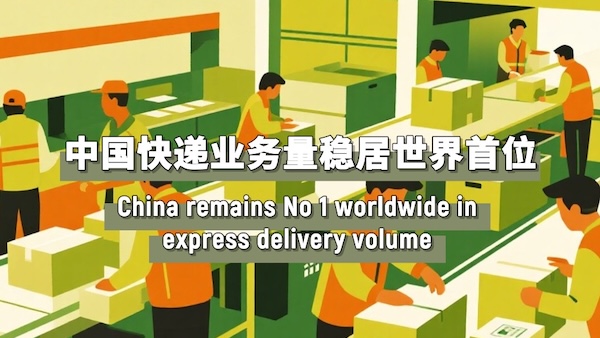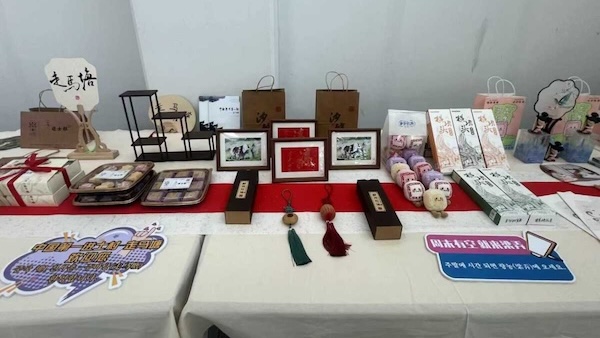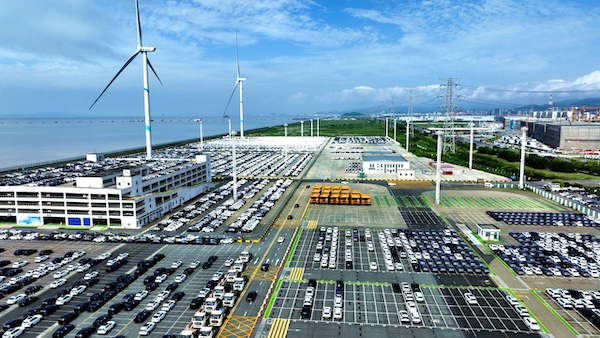Two ministries hail China’s foreign trade, bolstered by high-quality opening-up
China's Foreign Ministry and China's Ministry of Commerce on Aug 21 hailed the stable development of foreign trade amid the external growing risks and challenges, vowing that the country will continue to expand high-level opening-up, sharing development opportunities with all countries.
China's total goods imports and exports in yuan-denominated terms rose to 25.7 trillion yuan ($3.58 trillion) in the first seven months of 2025, up 3.5 percent year-on-year, data from China's General Administration of Customs showed. In July alone, total goods trade rose 6.7 percent to hit a new monthly record of 3.91 trillion yuan this year. Exports jumped 8 percent, while imports climbed 4.8 percent to mark the second consecutive month of growth.
Multiple foreign trade enterprises attributed it to the support of government policies, innovation in products as well as diversified trade markets. A Chinese expert said that the resilience of China's foreign trade has not and will not change, and the country will continue to serve as a stabilizer to global trade with its expansion of high-quality opening-up.
Stable growth
Asked to comment on China's recent economic data for July, in which foreign trade was a highlight, and an analysis that shows the tariff war and other external risks have dealt a blow to global trade and mounted pressure on China's export market, Chinese Foreign Ministry spokesperson Mao Ning said on Aug 21 that despite the complex and volatile external environment, China's foreign trade has continued to perform well.
That reflects the strong resilience of China's economy and booming global demand for Chinese products. This is the combined result of China's efforts to expand high-standard opening up, promote high-quality development, and improve and upgrade industries, Mao said.
"Facts have proven that international trade based on comparative advantages enables common development and benefits all parties. China's quality products are popular around the world and its diversified and stable market is favored by many. This is not something that could be changed by tariff or trade wars. China will continue to share its development opportunities with other countries through open cooperation for win-win results," Mao noted.
Also on Aug 21, Ministry of Commerce (MOFCOM) spokesperson He Yongqian told a press briefing that amid an increasingly complex international trade landscape this year, China's foreign trade has maintained a stable and upward trend, with supportive policies, efforts in market diversification and in improving the quality of goods, according to the spokesperson. The foreign trade growth rebounded month by month, with notable improvements in both volume and quality.
In the financial sector, China Export & Credit Insurance Corp underwrote $573.5 billion in short-term insurance in the first seven months, up 14.7 percent year-on-year. The Export-Import Bank of China disbursed over 700 billion yuan in loans for foreign trade.
Trade with emerging and other markets increased by 5 percent, accounting for 65.5 percent of the total trade, up 0.9 percentage points year-on-year.
New growth drivers emerged. In the first seven months, exports of mechanical and electrical products grew by 9.3 percent, accounting for 60 percent of the total, up 1.1 percentage points year-on-year. High-tech and high-value-added products such as smart home appliances, electric vehicles, industrial robots, and ships continued to record strong export growth.
China will remain committed to expanding high-level opening-up, focusing on its own development, and addressing various uncertainties with the certainty of high-quality development, the spokesperson said, adding that China has the confidence and capacity to safeguard stability and quality in foreign trade, working with more trading partners to tackle challenges and share development opportunities.
Strong resilience
"Since the US administration brandished the tariff stick this year, global trade continued to face downside risks, with increasing global trade costs and impacted global supply chains. Under this context, a number of China's foreign trade companies weathered global headwinds during the first seven months by exploring new markets, rolling out new products and opening up new channels," Wang Peng, associate research fellow at the Beijing Academy of Social Sciences, told the Global Times.
China's manufacturing and trade hub, Shenzhen, in South China's Guangdong Province, recorded robust growth in trade in the "new three" industries - new-energy vehicles, lithium ion batteries, and photovoltaic products - in the first seven months of this year, the Global Times learned from Shenzhen Customs on Aug 21.
As the nation pursues high-quality development, the city, which has long been at the forefront of China's reform and opening up, has stepped up efforts in industrial upgrading and transformation. In the first seven months of this year, Shenzhen Customs facilitated exports of "new three" products worth 62.18 billion yuan, marking a year-on-year increase of 21.5 percent, customs data shows.
Feiyan Blanket Co, a textile company in Lianyungang, East China's Jiangsu Province, is a representation of Chinese foreign trade enterprises' efforts to address external uncertainties.
The company produces about 12,000 tons of blankets annually, with about 80 percent of its products exported, mainly to the US. Xu Yingxi, general manager of the company, told the Global Times that "Our exports to the US have dropped by 20 percent this year, but with some measures, we can compensate for these losses in the future."
"We're currently developing new products, such as modifying certain processes to strengthen customer loyalty. We're also focusing more on domestic sales, potentially developing new local clients to fill the gap," Xu said, adding that the company is also exploring emerging markets such as South Africa and South America.
Zhu Qiucheng, CEO of Ningbo New Oriental Electric Industrial Development in East China's Zhejiang Province, an exporter of pet furniture and home furnishing products, highlighted the trade-stabilizing policies implemented by the Chinese government.
"For example, the Ningbo municipal government's service-oriented approach, including export credit support, boosted business confidence while ensuring effective policy adjustment an implementation through regular dialogues with export enterprises," Zhu told the Global Times on Aug 21.
Zhu also emphasized high-tech, branded growth to avoid rat race competition. "Specialized firms with patents sustained growth under tariff pressures. This tells you the importance of R&D investment and service trade transitions."
More importantly, after navigating tariff challenges in the first half of the year, the sentiment of businesses shifted from uncertainty to stability, gaining confidence in trade prospects, said Zhu. "Looking to the second half, I'm optimistic about further improvements in exports, driven by stable policies, diversified market strategies, and enhanced corporate competitiveness. The synergy between government and businesses will continue to propel China's trade forward in a complex global environment, injecting new momentum into economic growth."
Wang noted that the resilience of China's foreign trade has not and will not change. "China will continue to promote the multilateralism and inject greater certainty and stability into global economic development," Wang said.

 China Life Tips: Instant tax refunds redouble shopping fun
China Life Tips: Instant tax refunds redouble shopping fun
 China remains No 1 worldwide in express delivery volume
China remains No 1 worldwide in express delivery volume
 Kordyk's journey: From dream to deck
Kordyk's journey: From dream to deck



